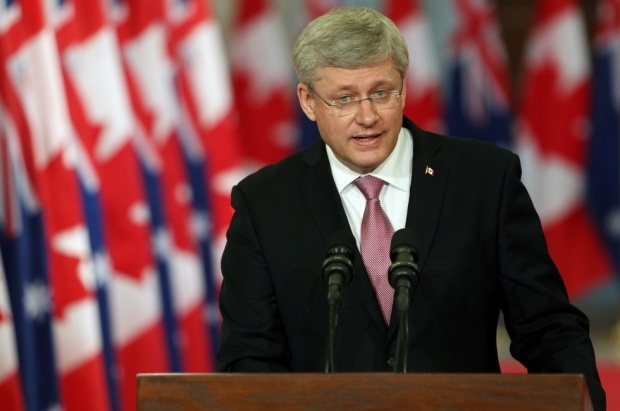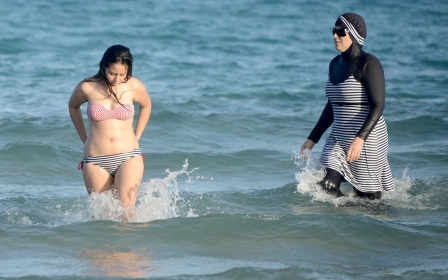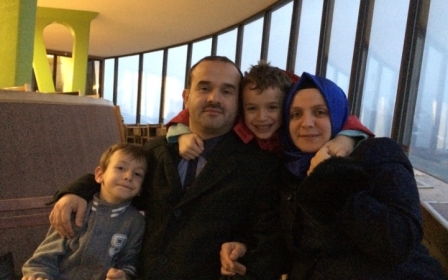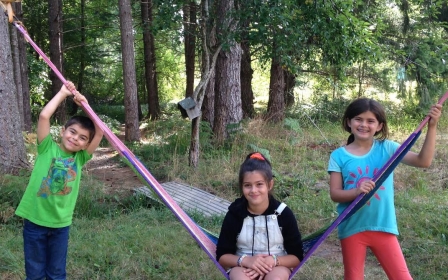ANALYSIS: Stephen Harper leaves pro-Israel imprint on Middle East

TORONTO, Canada – Stephen Harper has left the building.
Canada’s 22nd prime minister, long-time leader of the Conservative party, piano aficionado and friend of felines everywhere, officially resigned from politics on Friday, announcing that he will move to the private sector.
“We took principled decisions in a complex and dangerous world. And, whether at home or abroad, we were always proud to stand up for Canada,” Harper said in a message on Facebook, where he announced his retirement after an almost 18-year political career.
“Friends, we did a lot together, but I know the best is yet to come,” he said.
Harper served as prime minister from 2006 until November 2015, when his party lost the election to the more centrist Liberals, headed by now-Prime Minister Justin Trudeau.
Spokeswoman Anna Tomala told Agence France-Presse that Harper has formed a consulting group to provide advice to international clients. The firm “will work in tech, finance, energy, infrastructure and manufacturing along [with] other files, in the US, Europe, Middle East and Asia".
Harper, who represented a riding in Calgary, in western Canada, never lost touch with his conservative base, and he promoted right-wing policies both at home and abroad for nearly a decade.
Some of Harper’s most contentious positions were felt in the Middle East and North Africa, where he promoted fervently pro-Israel positions, signed major trade deals with Gulf states, including Saudi Arabia, and backed military involvement in Iraq, Syria and Libya.
Here are a few examples of where Harper left his most profound impact on Canada’s policies in the region.
‘A true friend of Israel’
While it can be argued that Canada was never truly an “honest broker” in negotiations between Israelis and Palestinians, Harper removed any semblance of balance to Canada’s approach to the conflict.
“Prime ministers before him were staunchly Zionist, as well, but never to the extent of Harper, whose unconditional support for Israel was a novel and especially dangerous approach to the issue,” said Tyler Levitan, a spokesman for Independent Jewish Voices, a group of Jewish-Canadians critical of Israeli policies towards Palestinians.
With Harper at the helm, Canada was consistently the first to support Israel’s right-wing government, even as it passed discriminatory laws, repeatedly bombed the Gaza Strip, killing numerous civilians, and expanded Jewish settlements in the occupied West Bank.
"When Israel, the only country in the world whose very existence is under attack, is consistently and conspicuously singled out for condemnation, I believe we are morally obligated to take a stand,” Harper once said.
Far-right Israeli minister Avigdor Lieberman described Canada under Harper’s Conservatives as “a true friend of Israel,” a position that experts said cost Canada a seat on the UN Security Council in 2010.
Ottawa also cut funding to the United Nations agency that supports Palestinian refugees (UNRWA) and Canadian organisations that worked on the issue of Palestinian human rights domestically.
In 2014, the Canadian and Israeli governments signed a memorandum of understanding pledging to oppose “boycotts of Israel, its institutions, and its people,” as the boycott, divestment and sanctions movement (BDS) gained prominence globally.
Harper’s stance on Israel changed how Canada is viewed in the region, Levitan said.
“This perception of Canada will have a lasting and damaging impact on Canada’s ability to play a constructive role in pressuring Israel into compliance with both international law and official Canadian policy.”
Today, while
Canada has maintained close ties with countries in the Gulf region since at least the first Gulf War, when Canadian troops provided secondary support to the US-led mission against Saddam Hussein in Iraq.
But Harper was behind the most important development in Canada’s relationship to Gulf Cooperation Council (GCC) countries in recent years, according to Canadian researcher Anthony Fenton: designating the area a “priority market” for trade and investments.
The Conservatives focused on strengthening ties to Saudi Arabia and the United Arab Emirates in particular.
“From this flowed greater resources and state capacities,” Fenton told MEE in an email, including creating trade commissioners, promoting exports, increasing the frequency of high level visits and greater participation in regional trade shows.
Under Harper’s leadership, Canada quietly signed a $15bn weapons contract to provide the Saudi government with light-armoured vehicles. The arms deal, which is going ahead in spite of mounting human rights concerns, is the largest in Canadian history.
Canada’s approach to the Gulf is in line with how the US, Canada’s most important ally, approaches the region, Fenton said.
That likely won’t change under a new government in Ottawa – with or without Harper in Canadian politics – as clearly evidenced by Trudeau’s unwillingness to cancel the controversial Saudi arms deal.
“Cultivating closer ties with the Saudis helps bolster Canada's standing as a emerging, secondary imperialist power… Likewise, the principle relationship for Canada in the world is that with the US; so long as the US backs the kingdom, Canada will, too,” Fenton said.
‘Boots on the ground’ in Libya
Harper led Canada’s military into the NATO-led mission to help rebel factions depose Muammar Gaddafi, shortly after popular protests erupted against the Libyan leader's rule in 2011.
Harper promised not to deploy Canadian “boots on the ground” in Libya, and instead committed to sending CF-18 jets to carry out aerial bombings and navy boats to patrol Libyan coastal waters as part of the NATO mission.
But CBC reported that Canadian soldiers were on the ground in Libya in 2011.
Journalist Yves Engler, author of The Ugly Canadian: Stephen Harper’s foreign policy, also reported that the Canadian government facilitated the transfer of arms to Libyan rebel fighters, in violation of UN resolutions in force at the time.
“After Gaddafi was killed, the Conservatives spent $850,000 on a nationally televised war celebration for the troops that fought in Libya,” Engler reported.
Even as Libya descended into deadly, sectarian chaos, caused in part by the power vacuum Gaddafi’s demise created and the cover foreign countries provided to opposition fighters, Harper defended the decision to join the mission.
“The decision was made at the outset that we were not going to go into Libya [on the ground] per se. It was going to be up to the Libyans to then make the best of the situation,” Harper said.
In 2015, it was revealed that Canada did not heed warnings from military officers who raised concerns that removing Gaddafi would bolster extremist groups.
“Later, military members would privately joke about Canada’s CF-18s being part of ‘al-Qaida’s air force,’ since their bombing runs helped to pave the way for rebel groups aligned with the terrorist group,” the Ottawa Citizen reported.
Weak response to Syrian refugee crisis
Harper faced mounting pressure during last year’s federal election to respond to the Syrian refugee crisis, after it was revealed that Canada had taken in only a fraction of the 1,300 Syrians it had promised to resettle.
Criticism mounted after it came to light that relatives of drowned Syrian toddler Aylan Kurdi had applied for, and been denied, asylum in Canada.
Local media also revealed that Harper had ordered Canadian immigration officials to stop processing Syrian refugees referred for resettlement by the United Nations refugee agency.
The criticism prompted Harper to pledge that Canada would resettle 10,000 Syrian refugees by the end of 2017. He was quickly questioned once more over his government’s decision to prioritise religious minorities for resettlement.
“Until the election, the Harper government’s response was little more than a cold shrug of indifference,” the Toronto Star wrote in an editorial last October.
The refugee resettlement issue likely contributed to the Conservatives’ loss at the polls and to Harper’s Citizenship and Immigration Minister Chris Alexander losing his seat in parliament.
New MEE newsletter: Jerusalem Dispatch
Sign up to get the latest insights and analysis on Israel-Palestine, alongside Turkey Unpacked and other MEE newsletters
Middle East Eye delivers independent and unrivalled coverage and analysis of the Middle East, North Africa and beyond. To learn more about republishing this content and the associated fees, please fill out this form. More about MEE can be found here.




